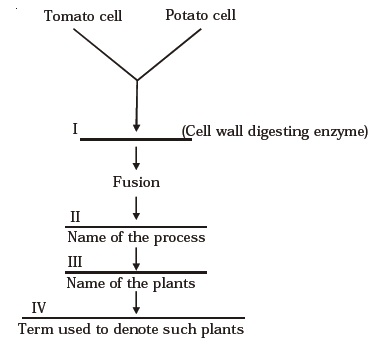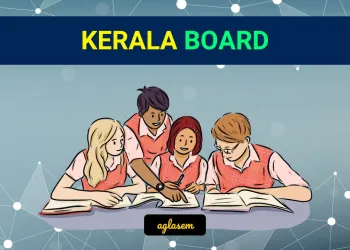Class 12 Important Questions for Biology – Strategies for Enhancement in Food Production
NCERT Exemplar Class 12 Biology is very important resource for students preparing for XII Board Examination. Here we have provided NCERT Exemplar Problems Solutions along with NCERT Exemplar Problems Class 12.
Question from very important topics are covered by NCERT Exemplar Class 12. You also get idea about the type of questions and method to answer in your class 12th examination.
Here you can get Class 12 Important Questions Biology based on NCERT Text book for Class XII. Biology Class 12 Important Questions are very helpful to score high marks in board exams. Here we have covered Important Questions on Strategies for Enhancement in Food Production for Class 12 Biology subject.
Biology Important Questions Class 12 are given below.
Multiple Choice Questions
- The chances of contacting bird flu from a properly cooked (above 100°C) chicken and egg are:
- a. very high
- b. high
- c. moderate
- d. none
- A group of animals which are related by descent and share many similarities are referred to as:
- a. breed
- b. race
- c. variety
- d. species
- Inbreeding is carried out in animal husbandry because it:
- a. increases vigour
- b. improves the breed
- c. increases heterozygosity
- d. increases homozygosity
- Sonalika and Kalyan Sona are varieties of:
- a. wheat
- b. rice
- c. millet
- d. tobacco
- Which one of the following is not a fungal disease?
- a. Rust of wheat
- b. Smut of Bajra
- c. Black rot of crucifers
- d. Red rot of sugarcane
- In virus-infected plants the meristematic tissues in both apical and axillary buds are free of virus because:
- a. the dividing cells are virus resistant
- b. meristems have anti viral compounds
- c. the cell division of meristems are faster than the rate of viral multiplication
- d. Viruses cannot multiply within meristem cell (s).
- Several South Indian states raise 2-3 crops of rice annually. The agronomic feature that makes this possible is because of
- a. shorter rice plant
- b. better irrigation facilities
- c. early yielding rice variety
- d. disease resistant rice variety.
- Which one of the following combination would a sugarcane farmer look for in the sugarcane crop?
- a. Thick stem, long internodes, high sugar content and disease resistant
- b. Thick stem, high sugar content and profuse flowering
- c. Thick stem, short internodes, high sugar content, disease resistant
- d. Thick stem, low sugar, conten, disease resistant
- Fungicides and antibiotics are chemicals that:
- a. enhance yield and disease resistance
- b. kill pathogenic fungi and bacteria, respectively
- c. kill all pathogenic microbes
- d. kill pathogenic bacteria and fungi respectively.
- Use of certain chemicals and radiation to change the base sequences of genes of crop plants is termed:
- a. recombinant DNA technology
- b. transgenic mechanism
- c. mutation breeding
- d. gene therapy.
- The scientific process by which crop plants are enriched with certain desirable nutrients is called:
- a. crop protection
- b. breeding
- c. bio-fortification
- d. bio-remediation.
- The term ‘totipotency’ refers to the capacity of a:
- a. cell to generate whole plant
- b. bud to generate whole plant
- c. seed to germinate
- d. cell to enlarge in size.
- Given below are a few statements regarding somatic hybridization.
Choose the correct statements.
i) protoplasts of different cells of the same plant are fused
ii) protoplasts from cells of different species can be fused
iii) treatment of cells with cellulase and pectinase is mandatory
iv) the hybrid protoplast contains characters of only one parental protoplast.- a.(ii) and (iii)
- b. (i) and (ii)
- c. (iii) and (ii)
- d. (ii) and (iii)
- An explant is:
- a. dead plant
- b. part of the plant
- c. part of the plant used in tissue culture
- d. part of the plant that expresses a specific gene.
- The biggest constraint of plant breeding is:
- a. availability of desirable gene in the crop and its wild relatives
- b. infrastructure
- c. trained manpower
- d. transfer of genes from unrelated sources.
- Lysine and tryptophan are:
- a. proteins
- b. non-essential amino acids
- c. essential amino acids
- d. aromatic and no acids.
- Micro-propagation is:
- a. propagation of microbes in vitro
- b. propagation of plants in vitro
- c. propagation of cells in vitro
- d. growing plants on smaller scale.
- Protoplast is:
- a. another name for protoplasm
- b. an animal cell
- c. a plant cell without a cell wall
- d. a plant cell.
- To isolate protoplast, one needs:
- a. pectinase
- b. cellulase
- c. both pectinase and cellulase
- d. chitinase.
- Which one of the following is a marine fish:
- a. Rohu
- b. Hilsa
- c. Catla
- d. Common Carp.
- Which one of the following products of apiculture is used in cosmetics and polishes:
- a. honey
- b. oil
- c. wax
- d. Royal jelly
- More than 70 per cent of livestock population is in:
- a. Denmark
- b. India
- c. China
- d. India and China.
- The agriculture sector of India employs:
- a. 60 per cent of the population
- b. 70 per cent of the population
- c. 30 per cent of the population
- d. 62 per cent of the population.
- 33 percent of India’s (Gross Domestic Product) comes from
- a. Industry
- b. Agriculture
- c. Export
- d. Small-scale cottage industries.
- A collection of all the alleles of all the genes of a crop plant is called:
- a. germplasm collection
- b. protoplasm collection
- c. herbarium
- d. somaclonal collection .
Very Short Answer Type Questions
- Millions of chicken were killed in West Bengal, Assam, Orissa and Maharashtra recently. What was the reason?
- Can gamma rays used for crop improvement programmes prove to be harmful for health? Discuss.
- In animal husbandry, if two closely related animals are mated for a few generations, it results in loss of fertility and vigour. Why is this so?
- In the area of plant breeding, it is important not only to preserve the seeds of the variety being cultivated, but also to preserve all its wild relatives. Explain with a suitable example.
- Name a man-made cereal? Trace how it was developed and where is it used?
- Fill in the blanks

- 7. A few statements are given below followed by a set of terms in a box. Pick the correct term and write it against the appropriate statement
- a. Mating of closely related individuals within the same breed
- b. Mating of animals of same breed but having no common ancestors on either side for 4-6 generations
- c. Mating of animals of two different species
- d. Breeding of animals belonging to different breeds

- What is meant by ‘hidden hunger’?
- Why are plants obtained by protoplast culture called somatic hybrids?
- What is protoplast fusion?
- Why is it easier to culture meristems compared to permanent tissues?
- Why are proteins synthesised from Spirulina called single cell proteins?
- A person who is allergic to pulses was advised to take a capsule of Spirulina daily. Give the reasons for the advise.
- What is aquaculture? Give example of an animal that can be multiplied by aquaculture.
- What are the duties of a veterinary doctor in management of a poultry farm?
- Would it be wrong to call plants obtained through micro-propagation as ‘clones’? Comment.
- How is a somatic hybrid different from a hybrid?
- What is emasculation? Why and when is it done?
- Discuss the two main limitations of plant hybridization programme.
- Interspecific crosses are rare in nature and intergeneric crosses almost unknown. Why?
- Differentiate between pisciculture and aquaculture.
- Give two important contributions of Dr. M. S. Swaminathan.
- The term ‘desirable trait’ can mean different things for different plants. Justify the statement with suitable examples.
Short Answer Type Questions
- You are planning to set up a Dairy Farm. Describe the various aspects you would consider before you start the venture.
- It is said, that diseases are spreading faster due to globalisation and increased movement of people. Justify the statement taking the example of H5N1 virus.
- Explain the concept of the Blue Revolution.
- A farmer was facing the problem of low yield from his farm. He was advised to keep a beehive in the vicinity. Why? How would the beehive help in enhancing yield?
- Life style diseases are increasing alarmingly in India. We are also dealing with large scale malnutrition in the population. Is there any method by which we can address both of these problems together?
- How can we improve the success rate of fertilisation during artificial insemination in animal husbandry programmes?
- What is meant by germplasm collection? What are its benefits?
- Name the improved characteristics of wheat that helped India to achieve green revolution.
- Suggest some of the features of plants that will prevent insect and pest infestation
- It is easier to culture plant cells in vitro as compared to animal cells. Why?
- The culture medium (nutrient medium) can be referred to as a ‘highly enriched laboratory soil. Justify the statement.
- Is there any relationship between dedifferentiation and the higher degree of success achieved in plant tissue culture experiments?
- Give me a living cell of any plant and I will give you a thousand plants of the same type” Is this only a slogan or is it scientifically possible? Write your comments and justify them.
- What is the difference between a breed and a species? Give an example for each category.
- Plants raised through tissue cultures are clones of the ‘parent’ plant. Discuss the utility of these plants.
- Discuss the importance of testing of new plant varieties in a geographically vast country like India.
- Define the term ‘stress’ for plants. Discuss briefly the two types of stress encountered by plants.
- Discuss natural selection and artificial selection. What are the implications of the latter on the process of evolution?
- Discuss briefly how pure lines are created in animal husbandry.
- What are the physical barriers of a cell in the protoplast fusion experiment? How are the barriers overcome?
- Give few examples of biofortified crops. What benefits do they offer to the society?
Long Answer Type Questions
- 1. You are a Botanist working in the area of plant breeding. Describe the various steps that you will undertake to release a new variety.
- a) The shift from grain to meat diets creates more demands for cereals. Why?
(b) A 250 kg cow produces 200 g of protein per day but 250 g of Methylophillus methylotrophus can produce 25 tonnes of protein Name this emerging area of research. Explain its benefits. - What are the advantages of tissue culture methods over conventional method of plant breeding in crop improvement programmes?
- Modern methods of breeding animals and plants can alleviate the global food shortage’. Comment on the statement and give suitable examples.
- Does apiculture offer multiple advantages to farmers? List its advantages if it is located near a place of commercial flower cultivation.
- a) Mutations are beneficial for plant breeding. Taking an example, justify the statement.
(b) Discuss briefly the technology that made us self-sufficient in food production. - Discuss how the property of plant cell totipotency has been utilised for plant propagation and improvement
- What are three options to increase food production? Discuss each giving the salient features, merits and demerits.
| « Previous | Next » |
Answers to Multiple Choice Questions
| 1-d | 2-a | 3-d | 4-a | 5-c | 6-c |
| 7-c | 8-a | 9-b | 10-c | 11-c | 12-a |
| 13-d | 14-c | 15-d | 16-c | 17-b | 18-c |
| 19-c | 20-b | 21-c | 22-d | 23-d | 24-b |
| 25-a |
Class 12 Important Questions for Biology
Biology Important Questions Class 12 are given below chapter wise.
- Reproduction in Organisms
- Sexual Reproduction in Flowering Plants
- Human Reproduction
- Reproductive Health
- Principle of Inheritance and Variation
- Molecular Basis of Inheritance
- Evolution
- Human Health and Diseases
- Strategies for Enhancement in Food Production
- Microbes in Human Welfare
- Biotechnology: Principles and Processes
- Biotechnology and its Applications
- Organisms and Populations
- Ecosystem
- Biodiversity and Conservation
- Environmental Issues
Other Study Material
Go Back to Biology Home Page Physics Chemistry Maths
To get study material, exam alerts and news, join our Whatsapp Channel.


